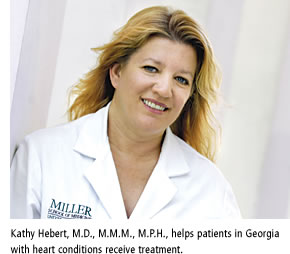 When the destructive five-day Georgian-Russian conflict over breakaway region South Ossetia made headlines last summer, one person paying very close attention was Miller School cardiologist Kathy Hebert, M.D., M.M.M., M.P.H. Hebert’s association with Georgia began in January 2007 when, after completing a Robert Wood Johnson Health Policy fellowship, she headed to Republican Hospital in Tbilisi to set up chest pain and stroke centers. When the destructive five-day Georgian-Russian conflict over breakaway region South Ossetia made headlines last summer, one person paying very close attention was Miller School cardiologist Kathy Hebert, M.D., M.M.M., M.P.H. Hebert’s association with Georgia began in January 2007 when, after completing a Robert Wood Johnson Health Policy fellowship, she headed to Republican Hospital in Tbilisi to set up chest pain and stroke centers.
On her third medical sojourn back to the region in May 2008, Hebert saw signs of the pending conflict. She was visiting the country again to expand a heart disease management program she established in the summer of 2007 at Republican Hospital. The expansion included South Ossetia and three other regional sites where patients were screened; those found to have weak hearts were enrolled in the heart failure management program that grew to serve more than 400 people.
“It was a very stressful time because parliamentary elections were about to be held and there was talk of manipulation and a threat of war,” says Hebert, an expert in health diplomacy. “This kind of stress is not out of the ordinary in South Ossetia, where there are military checkpoints and decreased access to health care. That leads to uncontrolled hypertension and depression.”
In the foreign program, inexpensive drugs are used and patients are treated and taught to manage their heart conditions. That program and a similar one Hebert established at Jackson Memorial Hospital are modeled after the successful heart disease management program she created and operated when she was director of the LSU State Task Force for Heart Failure in Louisiana.
“This model can work anywhere in the world that has enough infrastructure, physicians, blood pressure cuffs, and medication,” Hebert says. “It is expensive to do angioplasties and bypass surgeries, but it is not expensive to do patient education and provide the inexpensive medicines that have been proven to dramatically decrease mortality.”
And that’s why Hebert is heading back to the region. “A substantial number of patients have been affected by the war, and the needs are even greater,” she says. “When you see the difference you make in people’s lives, it is hard to walk away.” |


